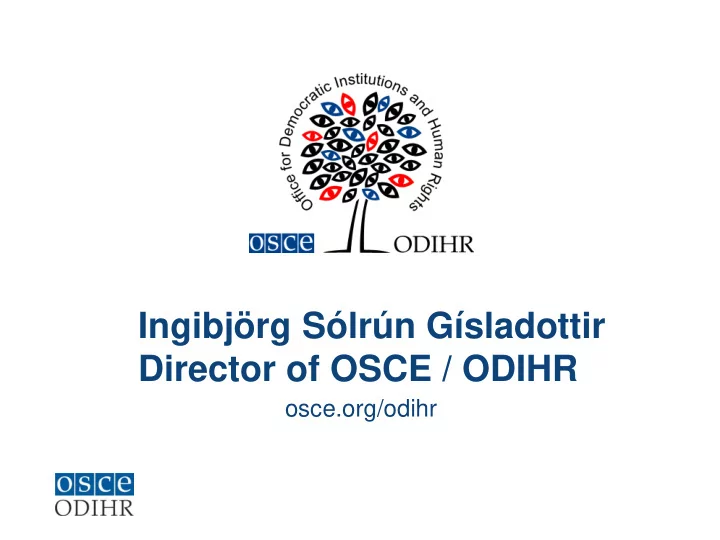

Ingibjörg Sólrún Gísladottir Director of OSCE / ODIHR osce.org/odihr
The OSCE Comprehensive Approach to Security Regional security based on three dimensions, all of equal weight and importance: 1. Politico-military dimension : Confidence-building, arms control, security sector reform, national minorities 2. Economic and environmental dimension : Good governance, tackling corruption, promoting environmental awareness 3. Human dimension : Human rights and fundamental freedoms, democratic institutions, freedom of the media
The OSCE Office for Democratic Institutions and Human Rights (ODIHR) • Established in 1991 as OSCE Office for Free Elections. Now OSCE’s main human dimension institution • More than 170 professionals from 34 participating states. • Assisting governments and civil society in the participating states in the implementation of human dimension commitments
Our main activities • Rule of law and legislative support • Democratic governance and gender • Migration and freedom of movement • Human rights monitoring and promotion • Human rights and security • Address discrimination, hate crimes, anti-Semitism, intolerance against Muslims & Christians • Training police, prosecutors, civil society and educators • Data collection on hate crimes • Strengthening capacity of Roma and Sinti.
And - elections • Observation: assess whether elections respect fundamental freedoms and are characterized by equality, universality, political pluralism, confidence, transparency and accountability, in line with OSCE commitments. • Follow-up: assist states in improving electoral processes based on recommendations of our observation missions, with expertise and legal reviews • Additional support: enhancing capacity of citizen observer groups, training observers, publishing handbooks to build technical expertise.
Election observation: Objectives • To assess whether OSCE participating States are meeting OSCE commitments, international obligations and other standards for democratic elections • To offer concrete and concise recommendations to support participating States to improve their electoral processes For both objectives: • Strong methodology for long-term and election day observation is needed 6
Electoral follow-up and assistance • Election observation not an end in itself • OSCE participating States committed to follow-up promptly ODIHR ’ s election recommendations • Many States requested support from ODIHR and reported on their activities • Examples of Follow-up activities: Legal reviews and expertise on drafting legislation In-depth assessments of specific electoral components Technical advice on implementation of recommendations Support to citizen observer groups 7
Elections and security: AFG example • ODIHR worked in close co-operation with NATO • Overall security and electoral integrity were closely linked • Electoral assistance and observation helped mitigate some of technical and political problems and preserve security 8
Election observation – joint endeavor • ODIHR can and should cooperate with parliamentary partners • Hope we can extend our joint efforts beyond election day • Need to sharpen attention of governments to the importance of prompt and effective follow-up 9
THANK YOU! osce.org/odihr
Recommend
More recommend